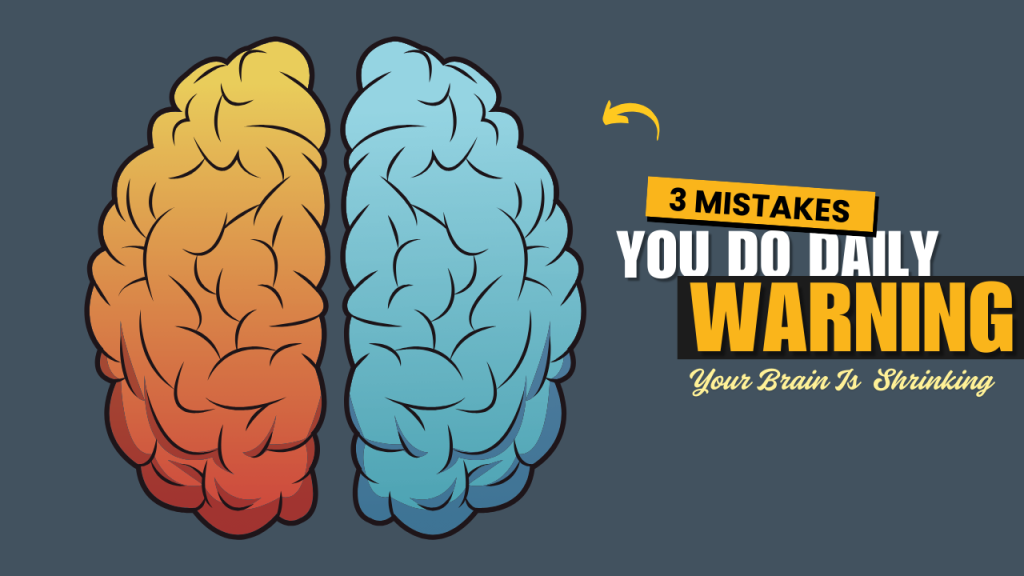Imagine slowly losing part of the most vital organ in your body—without even realizing it.
Every thought you form, every memory you treasure, and every emotion you feel, depends on your brain’s health. Yet, surprising research reveals that common everyday habits could be silently shrinking it, increasing the risk of memory loss, cognitive decline, and even early dementia.
Are you unknowingly sabotaging your brain? Let’s uncover the mistakes you might be making—and what you can do to protect your mind for life.

Mistake #1: Chronic Sleep Deprivation

Did you know? Just one night of poor sleep can cause brain tissue loss equivalent to a minor head injury.
In today’s hustle culture, sleep often gets labeled as “optional”—a luxury we trade for late-night work, endless scrolling, or binge-watching. But your brain pays a heavy price.
Lack of sleep directly reduces grey matter volume, especially in regions responsible for memory, emotion regulation, and decision-making. Studies published in Neurology show that people with chronic sleep deprivation are at higher risk for brain shrinkage and early-onset cognitive disorders.
Why does this happen?
During deep sleep, your brain goes into a self-cleaning mode, clearing out toxins that accumulate during the day. Without enough sleep, these toxins build up, damaging neurons and eroding brain volume over time.
Quick Tip: Prioritize 7–9 hours of high-quality sleep each night. Your brain’s longevity depends on it.
Mistake #2: Excessive Sitting and Inactivity

Interesting fact: Brain imaging studies show that adults who sit for more than 7 hours a day have thinner brain structures—especially in areas linked to memory.
Inactivity isn’t just bad for your waistline; it’s disastrous for your brain. Long periods of sitting decrease blood flow, limiting the oxygen and nutrients your brain needs to function and repair itself.
A UCLA study found that sedentary behavior was associated with thinner medial temporal lobes, the brain areas critical for memory. Even if you exercise regularly but spend most of your day sitting, you could still be harming your brain—a phenomenon known as the “active couch potato” effect.
Myth Buster:
“I go to the gym every evening, so sitting all day isn’t a big deal.”
Truth:
One workout doesn’t erase 8 hours of inactivity. Frequent movement throughout the day is essential.
Simple Action: Set a timer to stand, stretch, or walk every 30–45 minutes. Even light movement improves brain health.
Mistake #3: Poor Diet (High Sugar, Processed Foods)

Do you know? A single high-sugar meal can cause inflammation in the brain within hours.
Your brain needs quality fuel to thrive. A diet high in sugars, processed foods, and unhealthy fats triggers inflammation, leading to neuron damage and brain shrinkage over time.
Research in Frontiers in Aging Neuroscience suggests that a “Western diet” accelerates brain aging, shrinks the hippocampus (the memory center), and increases the risk of Alzheimer’s disease.
How it happens:
Processed foods spike blood sugar and release inflammatory molecules that cross the blood-brain barrier, damaging brain cells and hampering neurogenesis (the creation of new neurons).
Better Brain Boost:
Shift toward a Mediterranean-style diet rich in leafy greens, berries, nuts, olive oil, and fatty fish like salmon. These foods are packed with brain-protective antioxidants and healthy fats.
Bonus Brain Warning: Stress That Never Shuts Off
Surprising truth: Chronic stress can actually shrink the size of your prefrontal cortex—the brain’s control center for focus, self-control, and logical thinking.
In today’s hyperconnected world, the brain is under constant attack from endless notifications, deadlines, and worries. Persistent high cortisol levels wear down brain structures, especially the hippocampus, making memory and learning harder over time.
Protective Move: Practice mindfulness, meditation, deep breathing, or even short daily nature walks to dial down the stress response and protect your cognitive strength.
Final Thoughts: Your Brain’s Future is in Your Hands
The scary reality is that most people don’t notice brain shrinkage until it’s too late. But the good news?
Every small, positive change you make today can literally reshape and protect your brain for the future.
Prioritize sleep. Move often. Nourish wisely. Manage stress. These aren’t just wellness tips—they are critical survival strategies for your most precious organ.
Your brain is your life’s command center. Guard it fiercely—because once it’s gone, there’s no backup.
Frequently Asked Questions (FAQs)
Can brain shrinkage be reversed?
In some cases, yes. While not all brain volume loss can be reversed, research shows that certain lifestyle changes—like regular physical activity, a brain-healthy diet, quality sleep, and stress management—can promote neuroplasticity (the brain’s ability to reorganize and grow new connections) and slow down further shrinkage.
How much sleep is enough for brain health?
Most adults need 7 to 9 hours of uninterrupted sleep per night for optimal brain function. Sleep is essential for memory consolidation, toxin clearance, and overall mental clarity.
Is occasional junk food really that harmful to the brain?
Occasional indulgence isn’t likely to cause harm, but frequent consumption of high-sugar, processed foods can trigger chronic inflammation, which may impair cognitive function over time. A consistent diet is more impactful than an occasional treat.
How does sitting affect the brain if I also exercise daily?
Even with daily workouts, prolonged sitting throughout the rest of the day can reduce brain blood flow and volume. It’s important to combine exercise with frequent low-intensity movement during the day—like walking breaks or standing stretches—to protect brain health.
Can stress really shrink the brain?
Yes. Chronic stress increases cortisol levels, which can damage the hippocampus and prefrontal cortex—key areas responsible for memory, learning, and decision-making. Managing stress through techniques like meditation, deep breathing, or nature exposure can help.
Are there foods that boost brain growth or regeneration?
Yes. Foods rich in omega-3 fatty acids, antioxidants, and polyphenols—such as blueberries, walnuts, leafy greens, and salmon—support brain regeneration, reduce inflammation, and enhance memory and focus.
Does brain shrinkage only happen with age?
No. While brain volume naturally declines with age, unhealthy lifestyle choices can accelerate this process—even in young adults. That’s why prevention should begin early.
Take Action Now:
Which of these daily habits will you start changing today? Your future self—and your future brain—will thank you.






Good